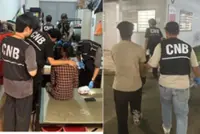Ashton Leow with his parents, Richard Leow and Claire Teo. Three-year-old Ashton has a rare disease that affects his immunity. - ST
SINGAPORE (The Straits Times/Asia News Network): When Ashton Leow had diarrhoea, vomiting and fever on a Thursday in October 2021, a doctor gave the toddler some medicine for stomach flu.
By Sunday morning, however, the usually lively and energetic boy, then aged two years and four months, just wanted to lie on the couch.
Already a subscriber? Log in
Save 30% OFF The Star Digital Access
Cancel anytime. Ad-free. Unlimited access with perks.





